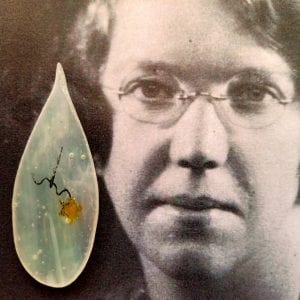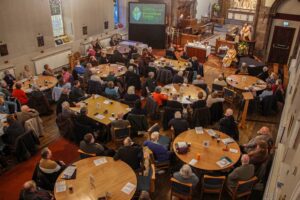Today marks the first commemoration of Jane Haining who, earlier this year, was included in the Scottish Episcopal Church calendar on account of her faith-filled life and example that saw her die in the Nazi Concentration camp of Auschwitz-Birkenau.

In Christian art, there is a tradition that the saints and heroes of the faith have glyphs, small symbols that tell something of their story. Jane Haining’s addition to the SEC calendar, inspired the Rev Kirstin Freeman to ponder and create a glyph for her on a handmade glass tear. Among the charges, that took Jane to Auschwitz, was “that she had wept when putting yellow stars on the girls.” After cutting and grinding a piece of glass into a tear, Kirstin painted on the reflection of a yellow star of David and a needle and thread as if it was in the process of being sewn onto a piece of clothing.
The valley of shadows cast its cloak
in her direction, and
without shiver of shame or fear,
she persisted in its watch.
For God reverberates her days
from valley floor to mountain top
each contour etching God deeper into her being.
Before the mountains,
before the hills
there was God, and she knew it,
lived it, loved it.
Prisoner and stranger knew her humanity.
She shared her bread like God’s love.
She wept, as Jesus wept,
for others pain,
and kept in his steps, never wavering,
rejecting detours for promise of stiller streams.
That time of rest would come, and did,
but not before
others knew the love and truth she did.
Living beyond her death,
because of the life she lived
reflecting God into a broken aching world.
A fractured world needs more Jane Hainings.
Jane Haining was born in Dumfries and Galloway, lived in Glasgow and felt called as a Church of Scotland Missionary in Budapest, Hungary. Her mission work was caring for Jewish children. At the outbreak of World War II, she was asked to return to Scotland and refused. She was subsequently arrested and transported to Auschwitz having refused to abandon the children in her charge. She is the only Scot known to have died in Auschwitz.
Jane Haining is well-known in Hungary (there is a street named for her in Budapest) but less so in Scotland. Work has been going on between Scottish Episcopal Church and Church of Scotland colleagues on educational materials on Jane Haining and the Holocaust for Scottish schools. There has been a book on her life by Mary Miller, Jane Haining: A Life of Love & Courage, and a play by Raymond Raszowski Ross, A Promised Land.
On account of her refusal to abandon those for whom she had care, and her death as a result, she is recognised as Righteous among the Nations (an honorific used by the State of Israel to describe non-Jews who risked their lives during the Holocaust to save Jews from extermination by the Nazis). She is also an outstanding example of Christian witness in a life lived for others – and this case, those of other faiths – and the willingness to face death as a result.
Almighty and everlasting God, who kindled the flame of your love in the heart of your holy martyr Jane Haining: give us such faith and power of love, that we who rejoice in her triumph may live by her example; through Jesus Christ, our Lord, who lives and reigns with you, in the unity of the Holy Spirit, one God, world without end. Amen.


